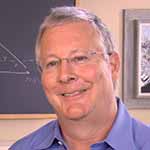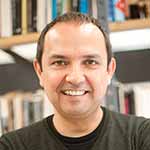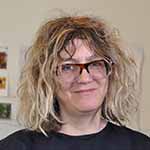UC San Diego Division of Arts and Humanities Faculty Excel on Campus
Published Date
Article Content
The University of California, San Diego Division of Arts and Humanities will be well-represented during the 42nd Annual Chancellor’s Associates’ Faculty Excellence Awards April 14, 6:00 p.m., at the Sanford Consortium for Regenerative Medicine on campus. During the event, Chancellor Pradeep K. Khosla will celebrate six exemplary faculty—three of whom hail from the arts and humanities division. They are: David O. Brink, distinguished professor in the Department of Philosophy, recognized for excellence in research in the humanities and social sciences; Teddy Cruz, professor of public culture and urbanism in the Department of Visual Arts, recognized for exemplary community service; and Anya Gallaccio, professor of visual arts, recognized for excellence in the performing and visual arts.
According to Dean Cristina Della Coletta, faculty excellence within the Division of Arts and Humanities, which she leads, is no surprise.
“Our division is devoted to promoting foundational, transferable and enduring values of the humanities and the arts, and the academic environment thrives on interdisciplinary dialogue, shared aspirations and transformative research,” stated Della Coletta. “Our outstanding faculty includes Pulitzer Prize winners, Mac Arthur Fellows and Tony Award winners, so the fact that half the number of excellent faculty recognized by the Chancellor’s Associates were selected from our division makes perfect sense to me. I couldn’t be more proud of our faculty members.”
The faculty awardees merit the recognition for compelling reasons. For example, Brink authored several articles and books including, “Mill’s Progressive Principles” (Oxford Press, 2013), a highly praised analysis of John Stuart Mill's seminal contributions to the utilitarian and liberal traditions. Brink is recognized in his field for expertise in ethical theory, the history of ethics and jurisprudence, and he recently gave the prestigious Lindley Lecture on “Responsibility, Incompetence and Psychopathy.” Brink also serves as the director of UC San Diego’s Summer Program for Women in Philosophy.

David O. Brink
“I’m extremely honored to receive the Chancellor’s Associates Award,” said Brink. “It’s humbling, because I know how many colleagues I have in my own department and elsewhere in the humanities and social sciences who are doing exciting and impactful work.”
Brink explained that the biggest satisfaction of the sort of research he does on issues in ethical theory, the history of ethics and jurisprudence is achieving conceptual clarity on difficult problems that matter to us—for instance, what makes a life go well, what we should do in cases of moral conflict, or whom we should punish and whom we should excuse.
“These sorts of issues evoke conflicting intuitions and generate different ideas and theories that can be hard to reconcile,” said Brink. “There’s nothing quite like the sense of zone or flow I experience when fully immersed in these kinds foundational issues. It’s also great when others appreciate this sort of work—when a light bulb goes on for students who can now make sense of a difficult debate or when one’s peers make use of the intellectual infrastructure one builds.”
Cruz, whose work centers around social inclusion, creates programs that foster collaboration between UC San Diego and diverse communities throughout the region. He works with Associate Professor of Political Science Fonna Forman to design and direct the Civic Innovations Lab for the San Diego Mayor’s Office and the Bi-National Citizenship Culture Survey. Cruz, winner of a prestigious Ford Foundation Visionaries Award, established and co-directs with Forman the UC San Diego/Blum Cross-Border Initiative, a project around regional poverty research and practice. He also serves as co-director of urban research at the Center on Global Justice on campus.

Teddy Cruz
“A lot of my work and research considers geographies of conflict, or borders. Seldom do we look at marginalized communities as participants in producing new forms of research and places of future activity,” explained Cruz. “For nearly 20 years, I have been elevating marginalized border neighborhoods as sites of intelligence and centers for creating new research.”
Cruz explained that he argues for meaningful engagement of the “local.”
“UC San Diego is 20 minutes away from the largest binational, metro region in the world,” stated Cruz. “To commit to this locality as a critical zone of investigation is huge. I am one of those people who have been pushing for this.”
Cruz said that the Faculty Excellence Award is a recognition of the new form of engagement in which research can be viewed as more collaborative.
“It is wonderful acknowledgement that conveys the commitment the current Chancellor has as part of his strategic plan to commit to the border region we occupy and immediately advance new forms of social and political equity,” said Cruz. “The larger rubric is rethinking the role of the public university in advancing new forms of social and political activity.”
Finally, artist and faculty member, Anya Gallaccio is a world-renowned sculptor who transforms the nature of her medium. She came up through the London art scene in the 1990s, taught around the world and earned more than 50 solo exhibitions. Permanent collections of her work are featured from the United Kingdom to Australia. At the university, Gallaccio serves on the Chancellor’s Advisory Committee on Gender Identity and Sexual Orientation.

Anya Gallaccio
“Having the courage to pursue one's interests and desires is one of the greatest gifts education can provide,” said Gallaccio. “It is such a significant honor to receive this recognition from the university. What's wonderful is the attention it raises for the arts on campus, which play such a significant role in our daily lives.”
Each year, the UC San Diego Chancellor's Associates—a program for donors who give an annual leadership gift of $2,500 or more to the university—recognize faculty members for their scholarship and overall contributions to the university, and the community at-large, with a citation and $2,500 honorarium. Nominations are accepted during the fall quarter and presentations made at the spring awards ceremony. One faculty member is selected in each of the following categories: Excellence in Undergraduate Teaching, Excellence in Graduate Teaching,
Excellence in Research in Humanities & Social Sciences, Excellence in Research in Science & Engineering, Excellence in Community Service and Excellence in Performing & Visual Arts.
The UC San Diego Division of Arts and Humanities ranks in the top 35 for arts and humanities subject rankings, according to U.S. News & World Report Best Global Universities (2016).
Share This:
Stay in the Know
Keep up with all the latest from UC San Diego. Subscribe to the newsletter today.



